






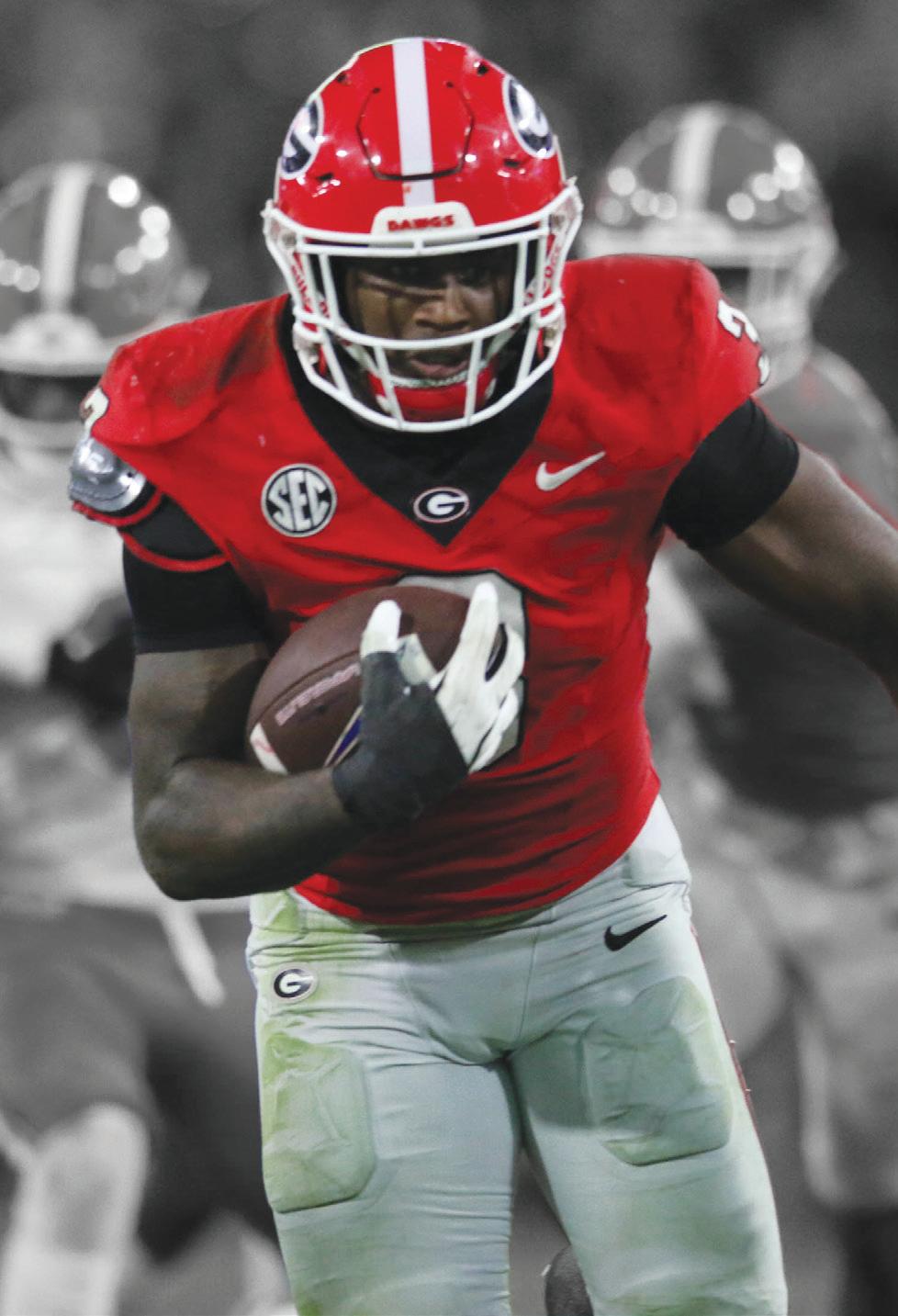


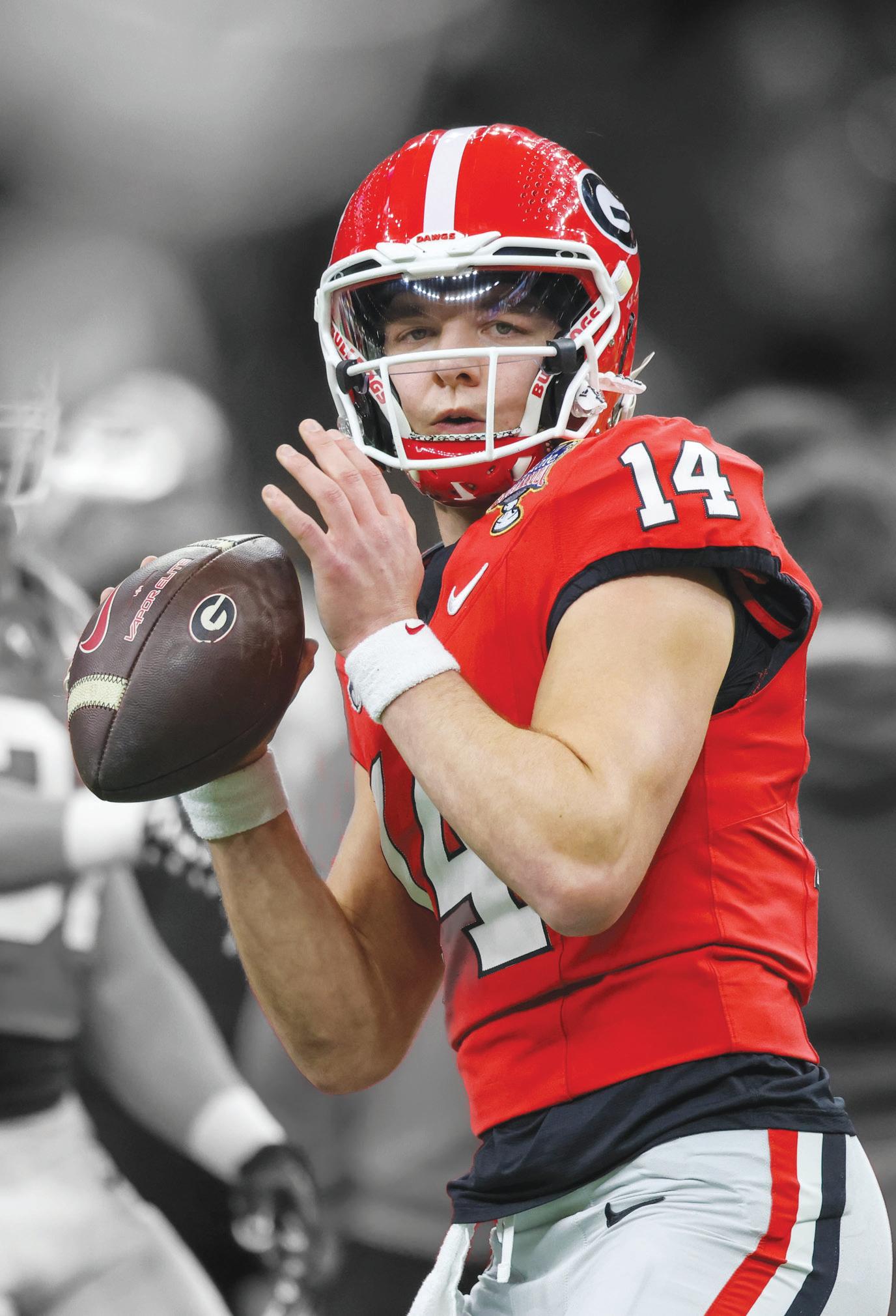


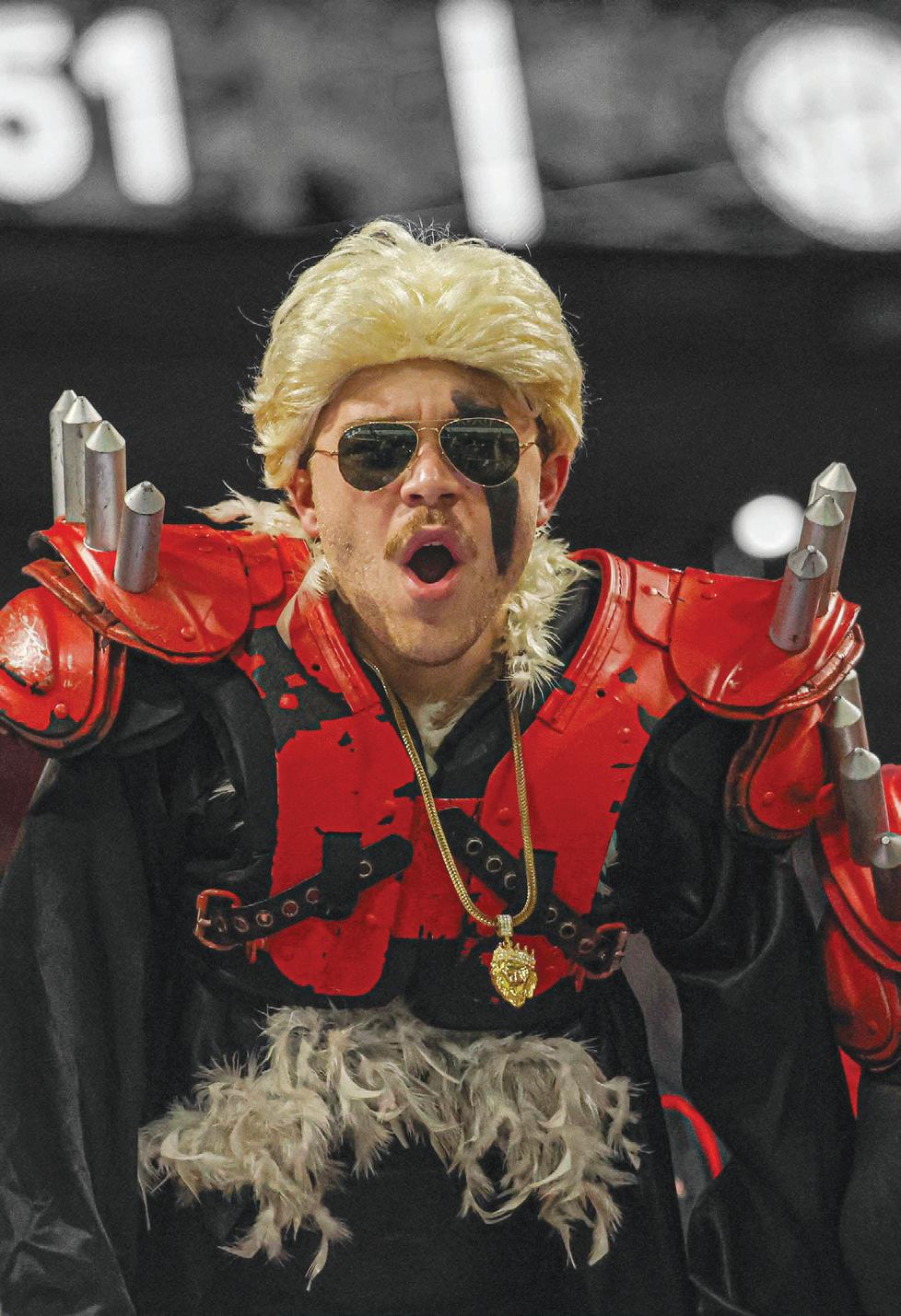
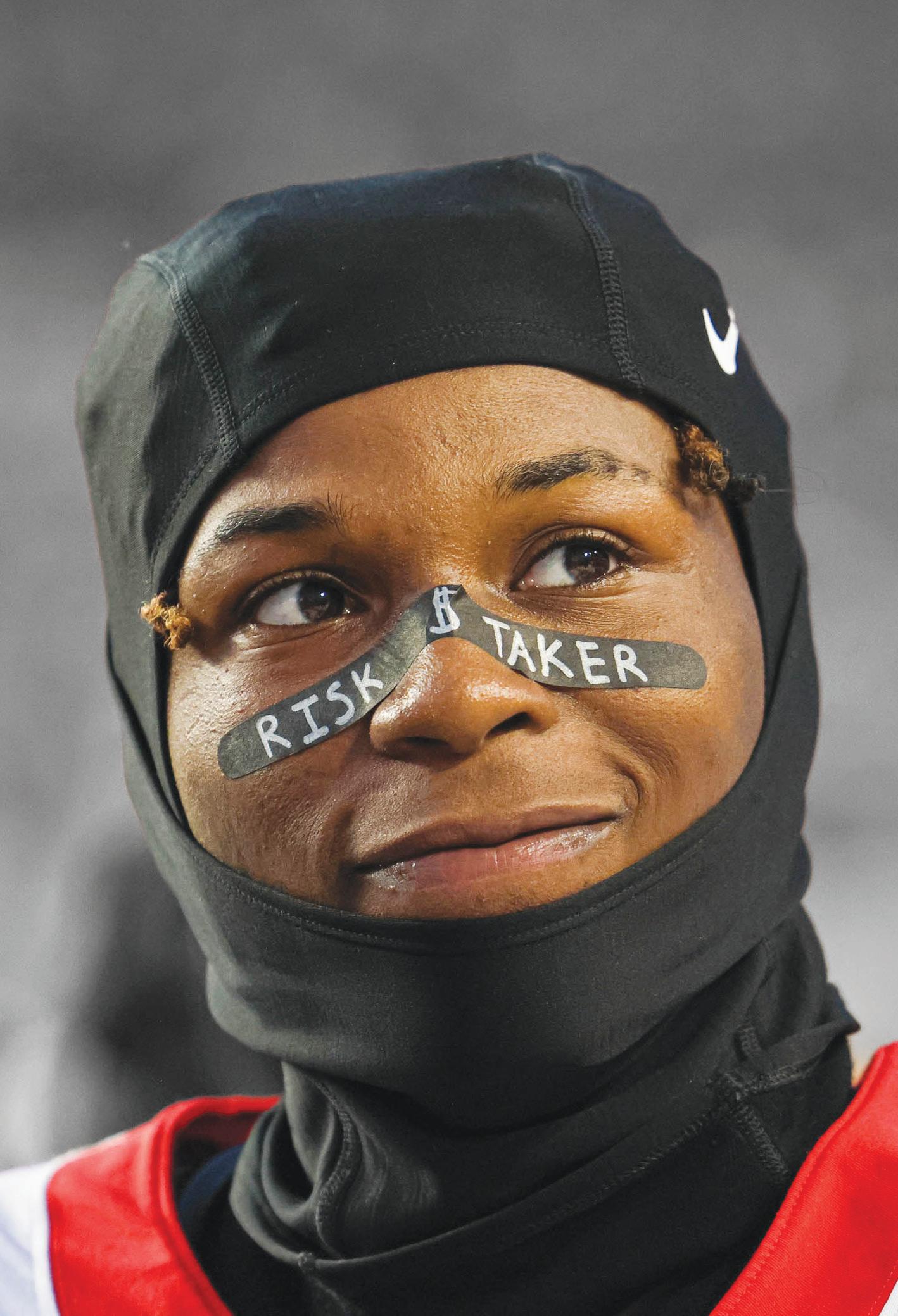


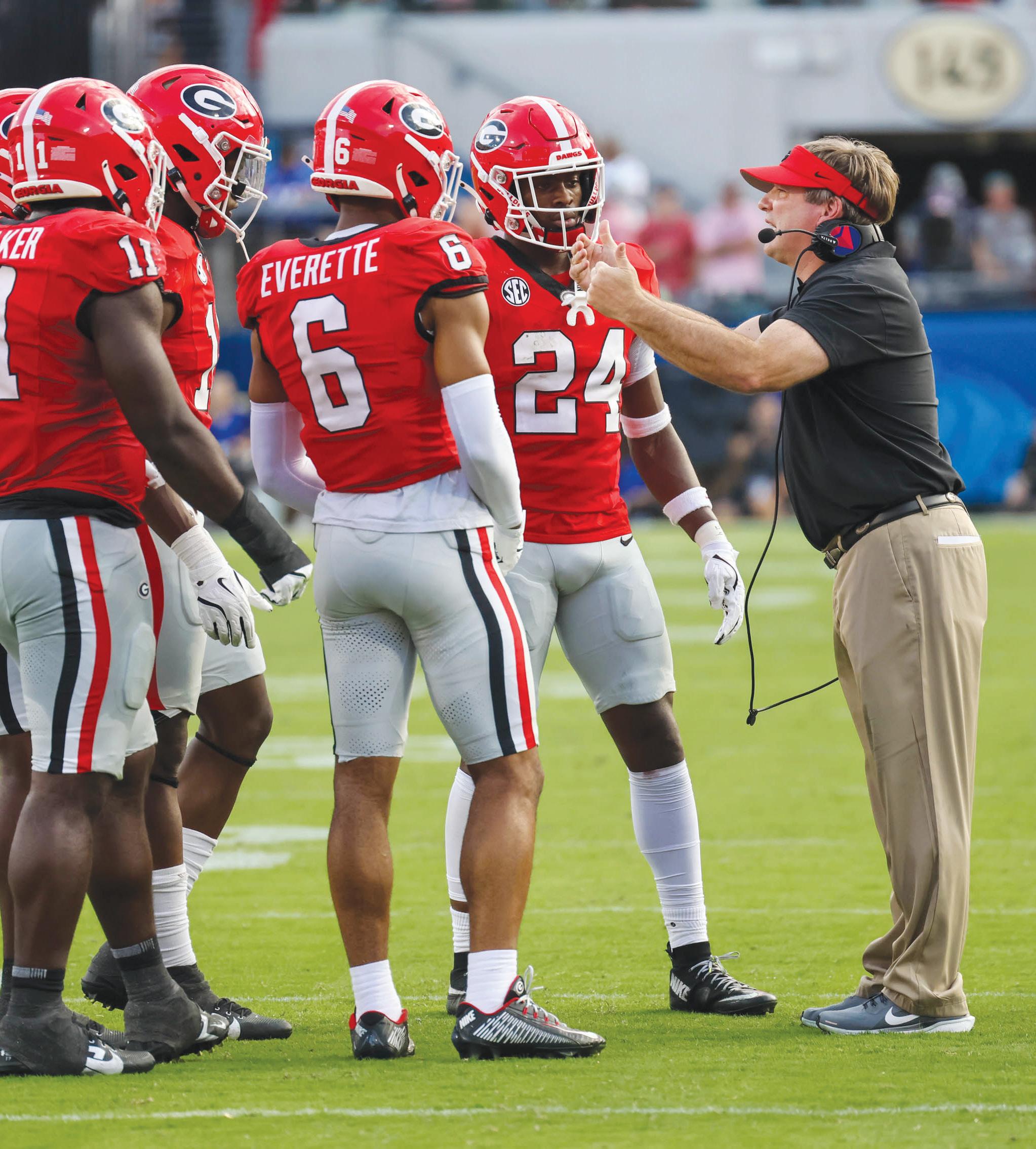
‘Not where they need to be’ Kirby Smart on next season
Andy Mathis
Georgia head coach Kirby Smart has made it clear: the Bulldogs are not meeting the expected standard – particularly the incoming freshmen.
Amid the team looking to claim its third national championship in five seasons, Smart expressed frustration with the team’s early spring performance, singling out players struggling to keep up with Georgia’s notoriously demanding practices.
“We really can’t practice to our standard because they’re all tired … so we got to do a better job of getting them in shape,” Smart said following a March practice. “They are not where they need to be … they have to be willing to receive coaching.”
Georgia once again faces the challenge of integrating new talent into an established, championship-caliber program. The team has seen massive turnover; Smart noted that only 26 players will have completed at least three seasons with the Bulldogs by the start of this season.
“We have the least number of players who have gone through three spring practices since I’ve been here,” Smart said. “So that should tell you something … We have a very young, inexperienced group.”
Despite being highly touted recruits, many of the freshmen have struggled with the physical demands of Georgia’s practices. The Bulldogs’ lack of veterans has left many positions, including key spots in the secondary and on the offensive line, open for competition, but Smart acknowledged the adjustments newcomers must make.
“I’m calling out all the freshmen,” Smart said. “We’re not in shape. There’s not a guy out
there, a freshman, that is sustaining his reps and just flourishing. They’re not used to the tempo of practice, nor should they be. There’s not a high school program in the country that can practice like we do.”
While Smart has expressed concern about the team’s overall fitness, he also emphasized the importance of leadership from the few experienced players who remain, such as safety
KJ Bolden.
“I prayed for moments like this, to be a leader in one of the rooms at Georgia,” Bolden said. “So just being able to take over that leader role and pushing the guys every day because I know what the standard is here, and I know what the standard [has] got to be. We’re supposed to go all the way.”
The Bulldogs, who signed the No. 2 recruiting class in the country for 2025, are not lacking in talent. However, transitioning from high school to one of the nation’s premier programs requires more than potential. Smart made it clear that players will need to earn their spots, regardless of recruiting status.
“We’ve got to probably simplify some to get guys just to go play and not be thinking out there,” Smart said. “I need the older players – I mean old to me is year two, year three, that’s old – to lead year one guys.”
The early struggles have not diminished Smart’s belief in his team’s eventual success. Despite the challenges of integrating new faces, he remains confident the Bulldogs will meet his lofty expectations — though not without some growing pains along the way.
“I think they’ll get there,” Smart said. “I mean, if they won’t, then somebody else will be in their spot.”




















Kameron Farmer
Gunner Stockton’s career start of 234 passing yards and a touchdown at the SEC Championship in Atlanta, Georgia, on Dec. 7, 2024, was nothing short of magical, but is it enough to earn him the position of QB1 next season?
As newly-crowned SEC champions, and in its first CFP appearance since the illustrious 2022 championship run, Georgia might have found its successor to outgoing quarterback Carson Beck.
Although Stockton is the presumed QB going forward, since Beck transferred to University of Miami, Georgia head coach Kirby Smart has not decided who will be starting as QB1 in August, despite praising both Stockton and freshman QB Ryan Puglisi for their performances thus far.
“Both of those guys are doing a great job,” Smart said. “I’m really pleased with where both of them are at. Ryan’s taking some reps with the ones. Gunner continues to grow and get better.”
Though the two quarterbacks are competing for the position of QB1, Stockton said he “wouldn’t want it any other way.”
“Ryan’s a great guy,” Stockton said. “He’s a good friend. That’s the thing about Georgia. I mean, there’s going to be good competition everywhere.”
Stockton is aware of the competition in the locker room, but as the season quickly approaches, he’s using the spring to focus on something else: getting reps.
“A bunch of reps help,” Stockton said. “Like coach Smart [said], you’ll get the most reps here at the University of Georgia. So, I think everybody, freshmen to fifth years, you’re getting a bunch of reps.”
The Rabun County-native has been busy since Georgia’s
season ended at the hands of the Fighting Irish in January.
“I’ve been working on my footwork and watching some film,” Stockton said. “And that’s the thing about spring ball, we have a bunch of time to watch film and looking at all the little things, honing in on them.”
Stockton knows his play on the field needs to elevate for Georgia to contend for a championship, but he feels leadership and communication are essential, especially in becoming comfortable with his receivers.
“You just gotta communicate,” Stockton said. “It takes time, so in the offseason … you’re building chemistry and just knowing how certain routes work and how you want it and how each person runs it a little different, so that’s when you work on it.”
Stockton is surrounded by a loaded receiving corps to start the new season.
Transfers Zachariah Branch and Noah Thomas are expected to make huge impacts in progressing the ball downfield, while returners Colbie Young, Dillon Bell, London Humphreys and Sacovie White are also expected to garner attention.
Stockton will have quite a few expectations placed on him, should he officially become Georgia’s QB1. He believes he is prepared for what is to come after seeing Beck navigate both the praise and criticism.
“I think there’s a lot of good things from Carson,” Stockton said. “He has really good footwork and stuff like that and the way he really processed information really well.” Stockton knows the high-profile spotlight that his position entails. From throwing touchdowns to dealing with the media, he is aware of what comes with the territory. He’s embracing it every day and is ready for the challenge.
Defensive lineman Elijah Griffin
The hype is real for the 6-foot-4, 310-pound defensive lineman from Savannah, Georgia, who entered college as the nation’s No.1 defensive prospect in his class, according to teammate Warren Brinson. “[Griffin is] the next Jalen Carter,” Brinson said. “I saw him at practice … He’s legit.” Griffin is explosive and powerful in the trenches, and his arrival comes at the perfect time as Georgia looks to replace four key contributors along the defensive line. The opportunity is there for him to crack the rotation. Given his talent and early buzz, don’t be surprised if Griffin makes an immediate impact — much like Carter did.
Wide receiver Talyn Taylor
Talyn Taylor, a polished 5-star receiver from Illinois, showed impressive growth throughout his recruitment and entered Athens facing high expectations. Scouts rave about his refined route running, smooth acceleration and reliable hands. The 6-foot, 190-pound playmaker racked up over 1,600 receiving yards and 26 touchdowns as a high school senior. With Georgia’s wide receiver room still searching for consistency — especially after last season’s struggles and early uncertainty this spring — Taylor could work his way into the rotation, particularly if injuries arise or depth becomes a concern.
Offensive lineman Juan Gaston
At 6-foot-7 and 360 pounds, Juan Gaston will be hard to miss; he’s the heaviest player on the team. The Atlanta native was the highest-rated O-lineman in Georgia’s 2025 signing class, coming in at No. 62 nationally. His new teammates were wowed as soon as he arrived. “First impression [of Gatson]: that’s a big guy, that’s a big man,” returning offensive lineman Monroe Freeling said. “Probably one of the biggest I’ve seen coming to Georgia. But he’s a hard worker, always got a smile on his face, and he’s coachable.” Georgia’s offensive line is undergoing a youth movement after losing four starters from last season, so Gaston has a real chance to push for early playing time. You can’t teach size, and if he continues trimming down and refining his technique, the massive freshman could find himself in the mix at tackle sooner rather than later.
Running back Bo Walker Bo Walker isn’t the biggest prospect, coming in at about 5-foot-9 and 210 pounds, but, according to staff and teammates, he might be the most college-ready. “Bo’s very bright,” head coach Kirby Smart said. “He’s had some really good runs. He’s had some mistakes. And what I like about Bo is he’s very teachable. He’s very coachable. And he’s got natural rush instincts.” Before transferring to Rabun-Gap Nacoochee for eligibility reasons his senior year, Walker put up 2,001 all-purpose yards and 30 touchdowns as a high school junior. This spring, he’s capitalizing on an injury-thinned backfield, with veterans Branson Robinson and Roderick Robinson both sidelined. Walker has gotten extended carries, and all reports suggest he’s made the most of it in a backfield battle behind expected star Nate Frazier. If he keeps up this momentum, Walker could be a key rotational back in 2025.
CREATIVE SERVICES 706-433-3021
CREATIVE SERVICES ASSISTANT Ashtin Barker COMMUNICATIONS 706-433-3009
COMMUNICATIONS MANAGER Alexis Derickson
COMMUNICATIONS ASSISTANT Emma Akang
BRAND AMBASSADORS Niki Karafakis, Sydney Toledo
DISTRIBUTION 706-433-3000 DISTRO@RANDB.COM
PROFESSIONAL STAFF
EXECUTIVE DIRECTOR Charlotte Varnum
706-433-3009 | cvarnum@randb.com
CHIEF FINANCIAL OFFICER Melissa Mooney
706-433-3007 | mmooney@randb.com
NEWSROOM ADVISER Kayla Renie
706-433-3026 | krenie@randb.com
MARKETING DIRECTOR Katie Martin
706-433-3012 | kmartin@randb.com
GUIDES & MAGAZINES SUPERVISOR Maddie Daniel 706-433-3046 | adaniel@randb.com
PRODUCTION COORDINATOR Blake Campbell 706-433-3021 | bcampbell@randb.com
Publishing online daily at redandblack.com and in print each month of the academic year by The Red & Black Publishing Company Inc. Subscriptions: $84. All rights reserved. Reprints by permission. Opinions expressed are those of contributors and not necessarily those of The Red & Black Publishing Company Inc. The Red & Black has covered the University of Georgia and Athens since 1893. Independent of the university since 1980, The Red & Black is a 501(c)(3) not-forprofit company with the dual missions of training students for future careers in journalism and serving our community as an independent news source. We receive no funding from the university and are selfsupporting through advertising, events and donations.
As a student-run news organization with the mission of training journalists, we know that mistakes happen and we do our best to correct them as quickly as possible. If you spot a factual error, please let us know by sending a correction to editor@randb.com. Corrections to items in print editions are published in the next possible print issue. Corrections for online-only articles are posted at redandblack.com/corrections.

‘That’s
Bo Underwood
Georgia loves to keep the cupboard full of linebackers.
Though longtime starters Smael Mondon Jr. and Jalon Walker are off to the NFL draft, the Bulldogs have CJ Allen and Raylen Wilson ready to man the top linebacker spots, and behind them, Georgia may have its future at the position already set.
Chris Cole and Justin Williams were two of Georgia’s biggest pickups from the 2024 recruiting class, with Williams ranking as the No. 1 linebacker in the country and Cole following closely behind at No. 3. After promising freshman seasons in 2024, they’re ready to make an even greater impact in 2025.
The pair are best friends off the field, quickly forming a bond as blue-chip freshmen who played the same position and moved to a new state at the same time. Williams is from Conroe, Texas, and Cole is a Salem, Virginia, native.
“He’s my best friend,” Cole said of Williams. “He’s a great guy. He helps this team a lot. He’s vocal, and he also encourages everyone on the team.” Williams made an impression on the coaching staff as a freshman for his high motor, work ethic and attitude — not always qualities a five-star freshman shows when forced into a reserve role.
“He’s probably one of the most positive people I’ve ever been around,” head coach Kirby Smart said of Williams. “He inspires hustle, effort. I just love the kid’s energy. He’s never down in the dumps. He competes. I think that he is the kind of alpha you need at the inside linebacker position.”
Cole saw action as a freshman following some injuries in Georgia’s linebacker group and turned heads immediately. He recorded 16 tackles and recovered two fumbles, drawing praise for his versatility as both a pass rusher and in coverage.
“He makes me a better player every day,” Williams said of Cole. “Seeing him go chase the quarterback, it makes me like, ‘Dang, I’ve got to pick it up,’ because that’s my best friend … I want to be like him and just work as hard as him.”
Cole’s ascent is even more striking, considering he’s been playing the position for only a couple years. He played safety his “whole life” before moving to linebacker in his senior year of high school. That background, coupled with his athleticism, gives him a unique skill set that Williams compared to that of Walker.
“I play everything,” Cole said. “If I’m on the field, coach can put me anywhere, I’ll play that. Pass rushing is a big thing for me, so I just want to keep working on
it this offseason.”
While both linebackers have a reputation as hard-working, coachable players on the field, they’ve taken to social media as a way to show off a more light-hearted side. Both are active on TikTok, with Williams’ account approaching 35,000 followers and Cole’s around 12,500. They post anything from dance videos together to cinematic slideshows documenting their football journey. It’s become a way for them to bond and express themselves off the field.
“I don’t get paid for my TikTok, I just do it because I love it,” Williams said. “I love the TikToks. It makes me have fun with Chris. It’s just something me and Chris picked up this season, and it’s just a tradition for us.”
TikTok may be a new chapter in the lore of Georgia linebacking, but if Cole and Williams continue to improve the way their coaches seem to believe they can, it’ll surely be a welcome one nonetheless.
“I’ve started a new ritual of asking a guy at the end of practice who he thinks the hardest worker is,” Smart said. “Who do you say has that passion and fire that’s sometimes lacking all over college football now? It’s a different climate in college football. So, it’s funny because Chris Cole and Justin Williams have both been mentioned multiple times by people as extremely hard working guys. They work hard, and I appreciate that about them.”

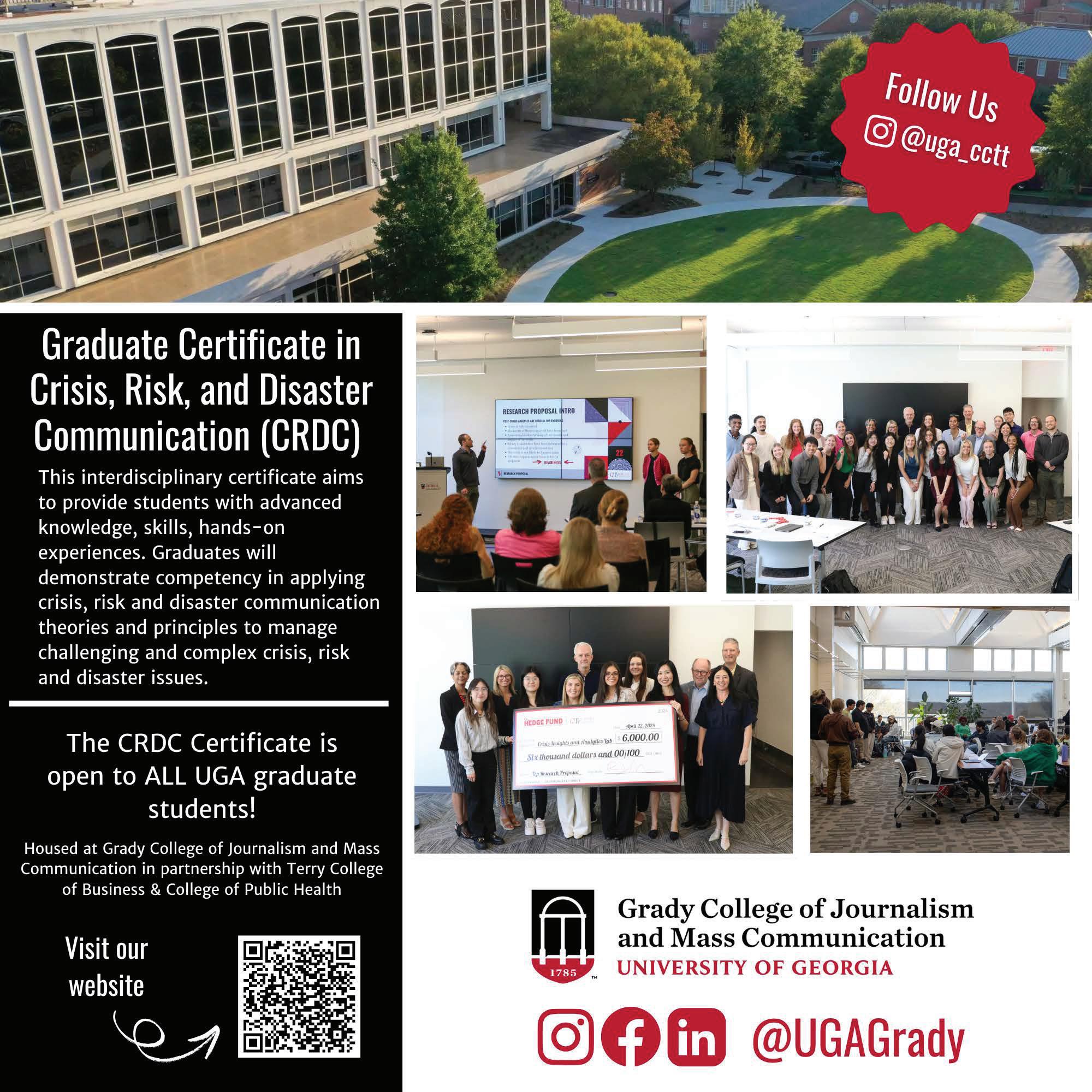





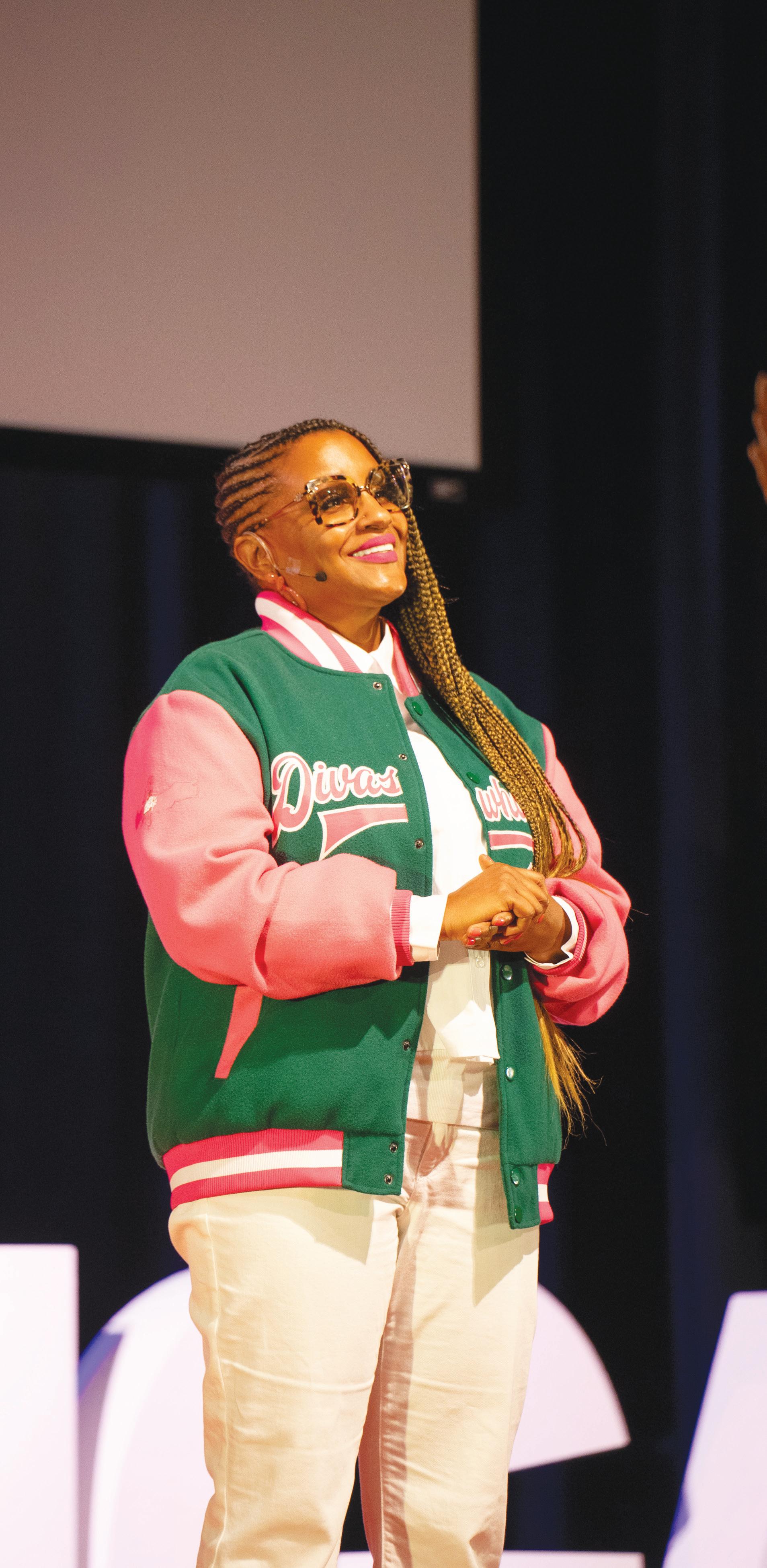

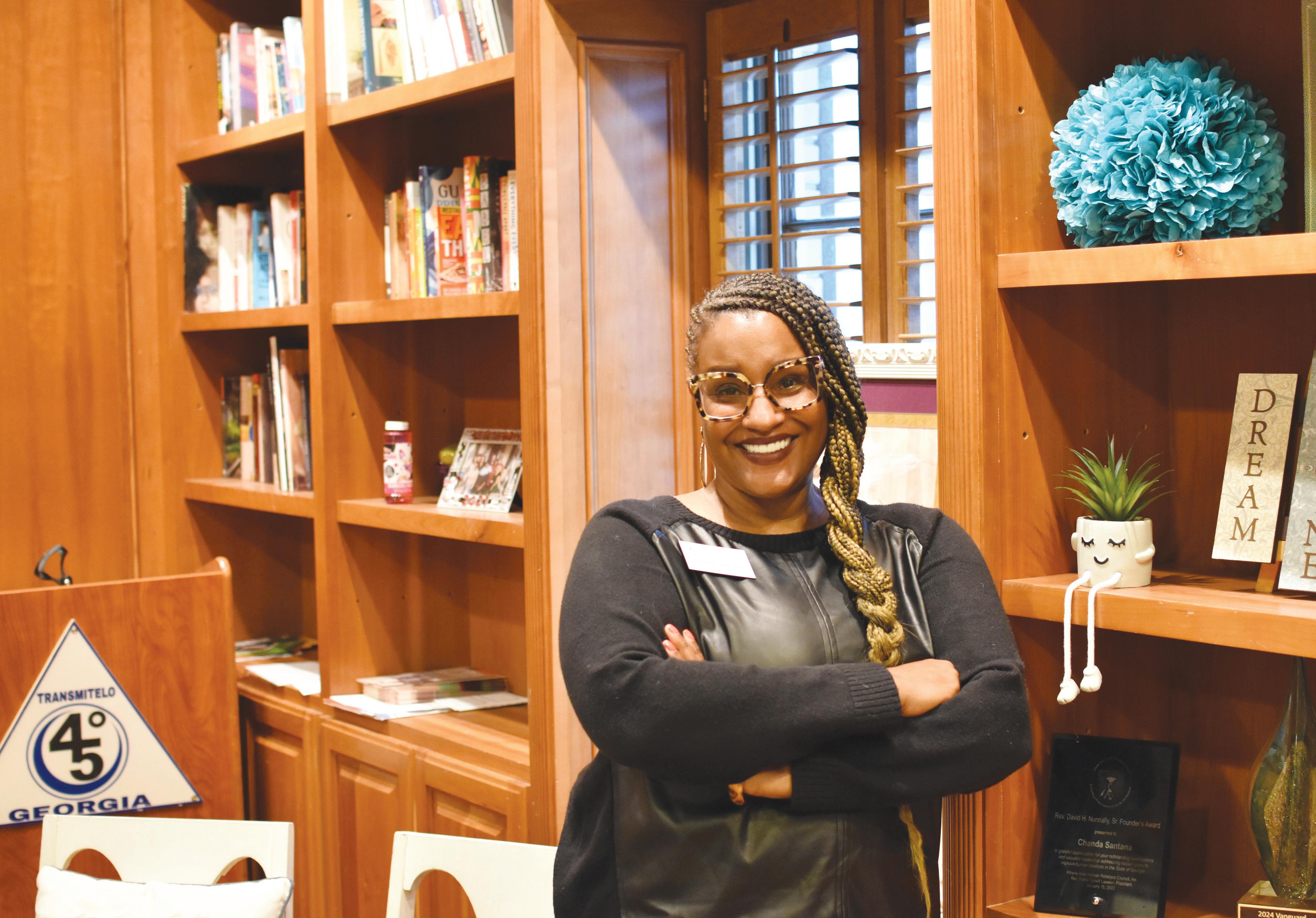
who won How Chanda Santana rebuilt her life, now lives to support others
Zach Leggio
Growing up in Asheville, North Carolina, Chanda Santana saw it took a village for her mom to raise her. Now, she works to create that same network of support in Athens for women who have faced substance abuse or trafficking.
Santana created her nonprofit, DIVAS Who Win, in 2018 to serve that mission. The name of the organization stands for “Develop Intentional Victory And Success” and came to Santana as a way to give the word “diva” a positive connotation for women in recovery.
Santana knows what it’s like to feel safe and have a supportive community. After she and her mother moved to Atlanta when she was 12, she lost her close-knit support system from Asheville and faced “unaddressed complex childhood trauma” that led her to the sex work industry for 10 years.
“That was probably just a rocky time from age 13 to 26,” Santana said. “I started having children at 20, so life was just really out of control.”
Even during this turbulent time, she was an advocate for others.
“I started doing grassroots activism at the age of 16, I wanted to change the rape laws here in Georgia,” Santana said. “I went neighborhood to neighborhood, trying to get petitions signed and collecting donations.”
Once she was able to quit sex work, she began having substance abuse issues while trying to raise her six children. Santana moved to Athens through Project Safe, eventually checking herself into a rehab facility.
While creating DIVAS, Santana originally intended it to be an organization to help women in substance-abuse recovery.
“I had no plans to talk about sexual exploit,” Santana said. “I was comfortable talking about an opioid use disorder because … that message had already picked up steam and it was in the mainstream.”
However, during the planning process, Santana’s 17-yearold daughter was sex trafficked. Her daughter was eventually found with the help of the FBI in July 2017, and Santana was able to find temporary help for her daughter at the same rehab facility she herself had attended.
“We got her back safely, sent her away for a while,” Santana said. “During the time that I was trying to regroup and think about, ‘Am I even still going to launch this agency, and then what parts of the story am I now going to tell?’”
However, she felt that she now had to talk about the issue of sex trafficking and make it a core part of her new nonprofit.
“I just woke up one day and said, ‘I’m going to tell the whole story. I’m going to talk about being a sex worker. I’m going to talk about sex trafficking,’” Santana said.
Seven months after her daughter was rescued, Santana got DIVAS Who Win approved as a 501(c)(3) nonprofit in February 2018, and it became the first and only female-centric organization that addresses both exploitation and addiction, according to Santana.
In June 2019, the nonprofit moved from a 300-square-foot warehouse to its current location on Hawthorne Avenue.
The new recovery center contains many different ways to help women feel safe as possible, complete with a closet where they can choose free outfits, a kitchen with a fully-stocked fridge, a laundry machine and a bathroom where women can safely shower and are provided with all of the toiletries they may need.
“We try to infuse dignity in any way [we can],” Santana said. “It doesn’t even feel good to have to ask someone for a washcloth or the fact that you’re in that position, so we try to empower in as many small ways as we can.”
The space also has an art room where women, or the children of women in recovery, can express themselves through artistic means.
“I’m a talker … but for a lot of people it’s not like that,” Ashley Willis, a graduate of the Way of a DIVA program and now a full-time employee of the nonprofit, said. “They speak their recovery out through art.”
The main goal of the center is for women to have a safe place to go during the day, while spending nights at recovery residences. The center even has times designated for women to be able to take naps in peace.
“Sometimes there’ll be three women in here at once, just taking a nap,” Santana said. “They don’t have to worry about being attacked or someone offering them substances.”
After hours, the center also hosts community organizations, such as a Latina family group and an enrichment
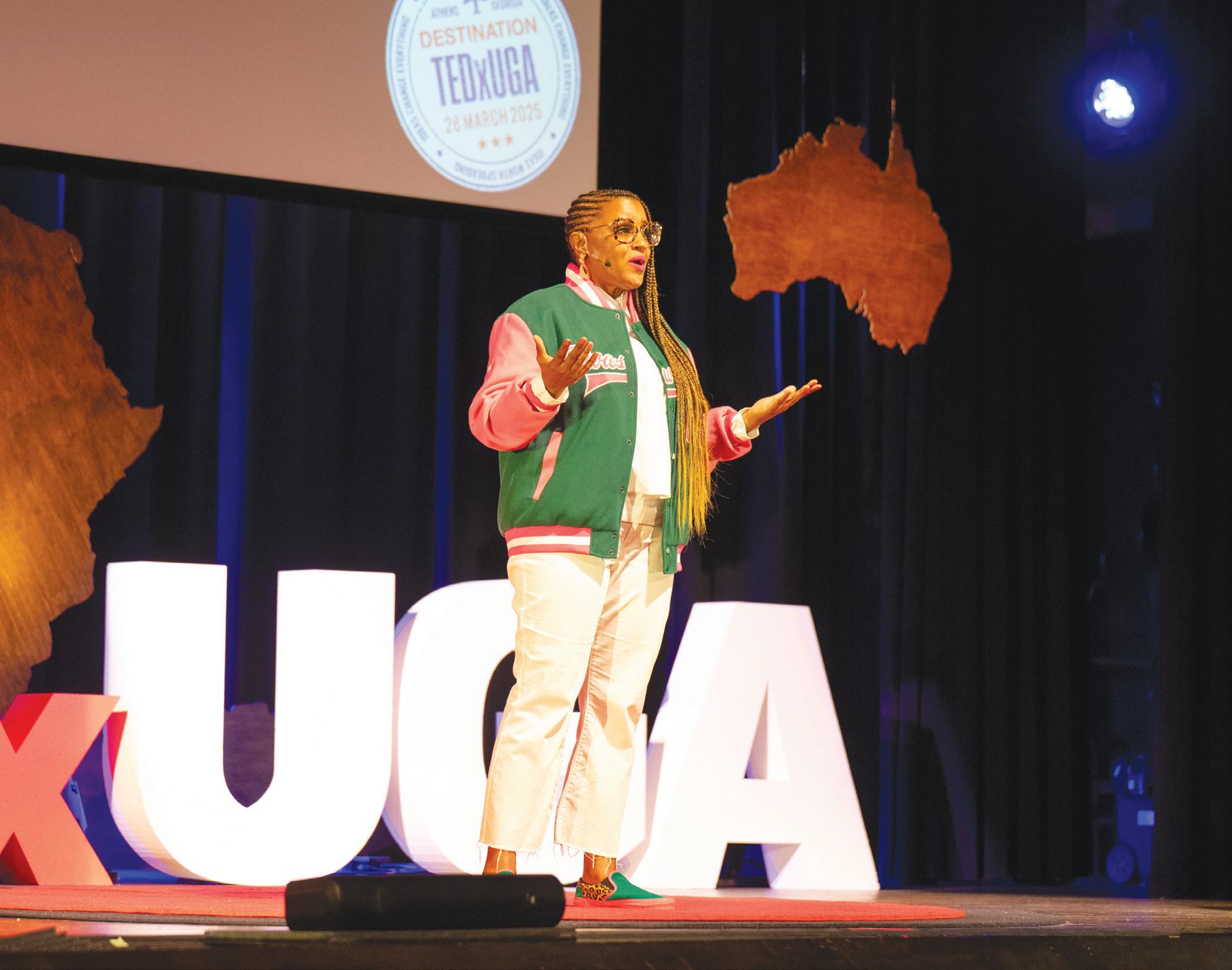
group for women. The program Santana created, called Way of a DIVA, is typically a year-long process, although this varies for different women depending on what stage of recovery they are in. Santana says nearly all of the women who come to DIVAS Who Win are in some kind of substance-abuse recovery process.
After a woman’s second visit to DIVAS, they receive a personal folder to help track their recovery process and divides the Way of a DIVA program into 90-day chunks.
“We call it a bingo card,” Santana said. “It has 16 squares, with maybe five of them are meetings, and she gets to X that off. Maybe two are art, that means she came upstairs. Maybe two are clothing, meaning she shopped. So we’re really just trying to get her interested in all these sections of DIVAS.”
I just woke up one day and said, ‘I’m going to tell the whole story. I’m going to talk about being a sex worker. I’m going to talk about sex trafficking.’
CHANDA SANTANA | FOUNDER OF DIVAS WHO WIN
After finishing each of these “bingo cards,” the women receive a keychain to mark milestones in their DIVAS progress. The levels and corresponding keychains are red, yellow, green and finally blue, marking program alumnae. Keychains and tokens are often important symbols in recovery programs to track progress with recovery and sobriety. Even when women exit the program before completing it, they are always welcomed back, according to Santana. Part of DIVAS’ mission is staying visible to women in recovery and giving them a place to come back to whenever they wish.
“We only go as far over as the woman wants us to go,” Santana said. “Sometimes that can be heartbreaking because sometimes when she gets back in her disease, she tells us no, tells us to stay out and stay away, and we have to honor that.”
Alumnae of the program also receive a green and pink letterman jacket at the annual “Joyfest” celebration in December, where women can be recognized for their progress through the DIVAS program.
After completing the program, women can apply for the DIVAS Foundations internship program, where they receive mentoring and are paid $15/hour for 250 hours, building soft skills and preparing for the workplace.
“Throughout my life, I’ve never really completed anything,” Willis said about her life before DIVAS. “So when it comes to the Way of a DIVA program, that’s where my passion really lies because I went through it and, for me, it represents just what recovery really means.” Willis came back to DIVAS to complete the internship program and now works for the nonprofit full time.
“I knew I wanted to do something positive in life, I just didn’t know what it was,” Willis said. “My skills are helping me financially, to be able to maintain, to be able to survive, and it’s something I love doing, whereas the jobs I had before, you couldn’t even get me to come to work.”
Now, DIVAS Who Win is expanding to not only help women in need of recovery, but to also prevent those needs arising in the future.
Through summer camps and after school programs, Santana has begun outreach programs for girls ages 11-16 to teach them about restorative justice, agriculture, STEM, fashion, therapeutic drumming and anger management. She has also worked to educate the community on these issues through her talk at TEDxUGA in March, where she was the first Athens community member to ever speak at a TEDxUGA event.
“When I checked into rehab on that Friday morning, I was not convinced that freedom was possible,” Santana said. “But the thing that I saw on the very first day of being there was that I was not alone.”











THE BRIDGE COMMUNITY CHURCH 973 Prince Ave. Athens Saturday, April 19th, 4:00 pm-6:00 pm
Take a break from dyeing eggs and stuf fing baskets. Join us for an unforgettable Easter experience complete with petting zoo, face painting, free Kona Ice, and a lot more fun for kids. Concer t on the front lawn: “Flatline Drive Band.” Fun for the entire family. FREE HOTDOGS, CHIPS


It’s not every day you happen upon a scientist sharing his research on alligators at Little Kings Shuffle Club, but through the Athens Science Cafe, something like this is a monthly occurrence.
According to an October 2024 report by the Pew Research Center, approximately 76% of American adults express a fair amount of confidence in scientists and their investment in the good of the public. However, per the survey’s results, only 45% of American adults feel that scientific research is communicated to the public in an accessible way.
The Athens Science Cafe is an organization dedicated to bridging that gap, hosting numerous events for more than a decade to make science more accessible to the Classic City. Science cafes are informal discussions on scientific topics presented in casual, public settings. Though the first cafe was started by Duncan Dallas in 1998 in the United Kingdom, there are now more than 100 science cafes registered across the globe.
Usually occurring once a month during the academic year and held in bars and breweries across Athens to reach as wide an audience as possible, the Athens Science Cafe is intended to bring together the academic and broader Athens communities, according to Katie Dillon, a graduate research assistant at the University of Georgia and director of the Athens Science Cafe.
“I think that there has always been a divide, and there is a very prevalent divide between scientists and nonscientists, and I think it’s important to sort of recommunicate what science means to people,” Dillon said.
“A lot of academic scientists, we are in very niche research areas, and I think the public wants to know more about what our research does to impact society.”
Dillon said that growing up, despite being interested in learning about the natural world, she was intimidated by science until college, when a chemistry professor made it digestible. She said she wishes there were more ways for young people to learn science in a way that “doesn’t intimidate them” – a desire that has fed into part of Athens Science Cafe’s mission.
John O’Brien, the social media director of the Athens Science Cafe, said it is important to get people to talk about science in a way people can understand as a way to “demystify” scientists in the eyes of the public.
“People don’t always know how [the scientific process] works,” O’Brien said. “Letting them know that it’s a lot of trial and error, fail after fail after fail, could be important.”
The cafe covers a diverse range of sciences. Although the life sciences are a prominent mainstay, speakers from other areas of sciences are welcome, with a recent speaker in February being a professor of psychology at UGA.
Last month’s event was held on Tuesday, March 20, at Little Kings Shuffle Club off of Hancock Avenue, headlined by Travis Glenn, a professor in UGA’s Department of Environmental Health Science, who presented anecdotes on research conducted on alligators.
The bulk of Glenn’s lecture focused on the work he did at the Rockefeller Wildlife Refuge in southwest Louisiana, where he and a team of other scientists traveled to alligator nests to collect blood samples and eggs, which, after hatching, were used to determine genetic information. After
the lecture, additional time was provided for a Q&A with audience members.
Although audience engagement is a primary factor of the Athens Science Cafe, the organization is as much a platform for scientists as it is for audiences to learn. Glenn, who specializes in developing DNA technologies, said he does not often get a chance to talk about his work.
“I was the guy that was bringing out animal skins and teeth and doing little talks to the campers and things like that,” Glenn said. “I’ve enjoyed doing these types of things my entire life, so I appreciate the opportunity to continue to do that.”
According to Glenn, outreach is what makes science relevant to the public. Glenn recalled his past experience with students at engagement events where they were given the chance to see live alligators. He said while people may forget his words, they will remember the experience because it changes their “perception of the world and how things are, because they just don’t get opportunities to interact with animals like that very frequently.”
“If you can build in some lessons about science, then if they remember anything beyond just, ‘That was really cool to touch that animal,’ then you’ve made a positive impact on their lives,” Glenn said.
For Athens Science Cafe, impact is key, and anyone can do it. When it comes to science, Dillon said, it is not about being stereotypically “smart,” but rather about trusting yourself.
“‘Smart’ is such a subjective term, and I think you just have to have an open mind when it comes to science, and an open mind to your own abilities,” Dillon said.
Caroline Feagin
I can’t remember the last time I’ve opened TikTok, or other social media platforms, without being bombarded with photos, videos and text posts promoting the latest health trend. Whether it’s taking olive oil shots on an empty stomach or embracing a full-carnivore diet, wellness culture is inescapable.
The concept of “wellness” has permeated the online sphere for quite some time. According to the Global Wellness Institute, the wellness economy boomed in the wake of the pandemic. Based on data collected between 2019-2023, the wellness industry reached a peak of $6.3 trillion in 2024, and it’s expected to continue growing rapidly.
The wellness industry boom has been paralleled by growth in the influencer economy, which is worth approximately $250 billion and expected to grow to around $500 billion by 2027, according to Goldman Sachs.
While there are countless types of influencers online, some of the most prominent are those who promote a wellness lifestyle. These YouTubers, podcasters and TikTok creators share fitness, health and skincare advice online with large audiences, promoting products and practices they claim are the “key” to becoming the healthiest version of yourself.
But beneath all the ab workouts and retinol recommendations, there is an underlying toxicity in how wellness culture operates on social media. An obsession with perfection has led many young people, especially young girls, to believe they need to spend thousands of dollars on products recommended by online personalities. In fact, according to Pew Research Center, 50% of women aged 18-29 said they had purchased an item after seeing an influencer post about it online.
Perhaps the biggest problem with wellness culture is how it perpetuates unrealistic standards of wellness. Some of the most popular wellness trends in 2024 were more extreme – red light therapy, drinking raw milk and bovine colostrum were all trends that exploded in popularity last year.
While some of these fads are harmless in moderation, social media algorithms bombard users with these trends, making them feel compelled to follow each one to embrace wellness. Ironically, the obsession with “being well” can lead to prolonged anxiety and body image issues, according to Psychology Today.
Another concerning trend in wellness culture is the skincare craze among preteens. Driven primarily by young influencers online with multi-step skincare routines, the demographics of skincare product shoppers has gotten progressively younger. Sephora stores have now been overrun by “Sephora kids,” as young as elementary school students, shopping for skincare and makeup products.
Dermatologists warn that many products tweens buy are not suited for their skin. These products often contain ingredients to treat oily skin, which works for older teens and young adults, and can be dangerous for younger people, whose skin is much softer.
Elaborate skincare routines are not just prominent among young teens. A viral trend on TikTok called the “morning shed” combines skincare with other products

meant for hair, eyes and mouth care. Participants will apply an assortment of different skin, self care and hair products at night, sleep in it and wake up the next morning to “shed” it off.
Some wellness influencers adopt popular dieting trends, often parroting misleading or false information about food. According to a survey conducted by MyFitnessPal and Dublin City University, only around 2% of TikTok dieting trends fall in line with public health and nutrition guidelines. What’s even more concerning is that, of those surveyed, 87% of Millennial and Gen Z TikTok users said that they use the platform for advice concerning their health.
This highlights troubling aspects of wellness culture and the industry. As “expertise” shifts aways from those trained in nutrition, dermatology and kinesiology, young people are increasingly falling victim to an industry that profits off their insecurities. Prioritizing health is important, but chasing perfection can be detrimental. True wellness lies in balance, not obsession.
Face masks, pimple patches and heatless curls are not inherently harmful. But, the excessive use of these regimens in the pursuit of beauty is physically and mentally taxing. Worrying about every perceived physical imperfection only triggers further insecurities, driving us deeper into the consumerist cycle that pervades the wellness community. It begs the question, when does the pursuit of wellness become an illness?
Caroline Feagin is a sophomore journalism major at the University of Georgia.
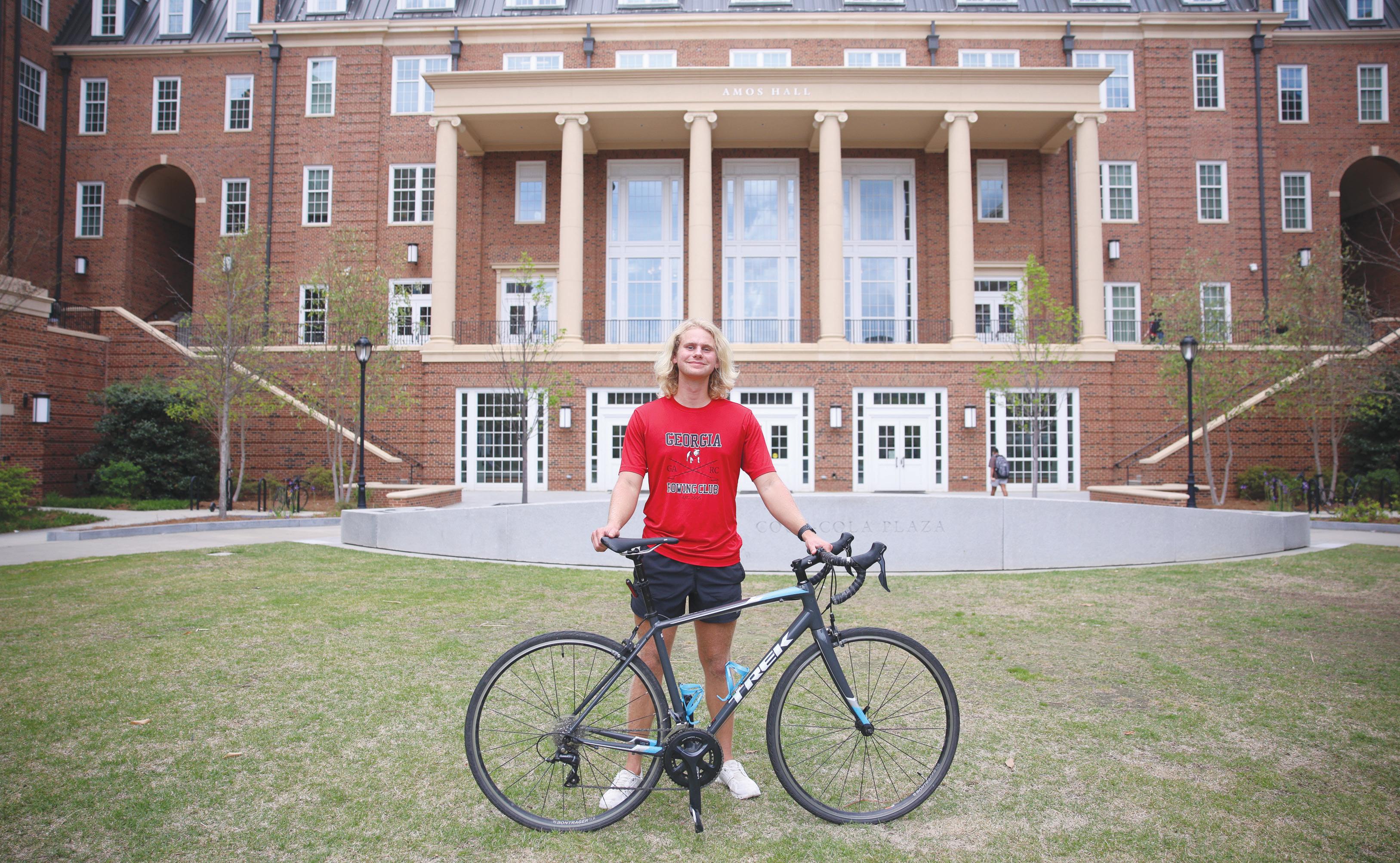
Rachel Roberts
Biking is becoming an increasingly popular method of transportation for Athenians. This trend, however, has highlighted the ways in which Athens is largely inaccessible for biking. Clubs on the University of Georgia’s campus and other local organizations are striving to improve bike safety and accessibility within Athens to make it a place where more people want to bike and feel comfortable doing so.
Frustrated with the morning traffic and narrow road on Williams Street prohibiting him from riding his bike to class, Colby Cannizzaro, a sophomore management information systems major at UGA, was inspired to start Bike UGA, a club that focused on improving biking and sustainable transportation on campus, in October 2024.
Bike UGA is not a club solely focused on racing or group rides; rather, it recognizes the importance of improving biking accessibility and making campus, along with Athens, feel like a more bikeable place.
“A lot of times when you’re riding your bike, you somehow feel less important than a car, even though you’re more vulnerable,” Cannizzaro said. “It’s all about trying to put UGA in a place where people can choose to bike instead of driving to campus every day.”
Maddison Davis, a junior management information systems major at UGA, is the secretary of Bike UGA. At first, Davis was hesitant to bike around Athens, but, with some encouragement from Cannizzaro, she realized it is “a lot easier” than she thought it would be.
“As somebody who has always been a little more environmentally and sustainably conscious, I was ready to put my car keys aside and start biking a little bit more for my own health, and then for the environment,” Davis said.
Environmental sustainability is critical to the club’s overall mission and goals. Both Cannizzaro and Davis view biking as more than just a sport or a workout; they also see it as an environmentally-conscious alternative method of transportation. Fueled by the hope to see UGA’s campus filled with people travelling by bike, scooter and on-foot, Cannizzaro wants the enthusiasm of Bike UGA to “inspire a culture of alternative transportation.”
“I think the big goal of Bike UGA is eventually just to have [Athens] be a place where you really don’t see that many cars,” Cannizzaro said.
In addition to focusing on improving biking accessibility around Athens, Bike UGA also hosts group rides that are open to anyone and offers bike repairs on Wednesday afternoons outside Tate Student Center.
Cannizzaro said there are about 30 active participants in the club and four officers who help to plan projects and events and organize the weekly group rides. All group rides begin at Tate; bikers then travel to East Campus on River Road to the Oconee Rivers Greenway, where they are able to bike without worrying about the traffic congestion of downtown Athens.
Bike UGA is also making a mark on UGA’s student body through tabling at Tate and student outreach. As part of its efforts to address bike safety in Athens, the club recent-
‘It’s not just food, it’s an experience’
chef brings Italy to Athens
With complete focus, Chef Filippo Trapella tosses freshly boiled pasta in a pan full of his homemade sauce, the rich aroma filling the air, and he completes the dish with finely grated Parmesan cheese. For Trapella, cooking is less about serving the food and more about sharing his Italian culture and letting others experience it firsthand.
As an Italian-born chef from Bologna, Trapella brings authentic Italian cuisine to the Athens community through private events, catering, cooking classes and weekly pop-up dinners.
Trapella moved to the United States in 2013, settling in Ohio for three years before relocating to Athens in 2016. In Italy, he worked as a freelance architect, but after moving, he pivoted his career path to pursue his passion of cooking while still “maintaining this independence.”
Trapella began as a food blogger, posting his dishes on social media, but after the pandemic, he launched Athens Pasta Lovers to cook for clients directly.
Athens Pasta Lovers is an Italian private dinner company offering three options to clients: a private dinner experience for four to 12 guests, pasta bar catering for a minimum of 20 people and weekly pop-up dinners at Hendershot’s, where guests can either dine in or take out their pasta dish.
Customers can choose between different pastas for the catered pasta bar option. Recently, Trapella catered a sorority’s movie night event, offering amatriciana and arrabbiata style pastas.
Trapella’s family was another reason he took on cooking, with his grandparents on one side of his family owning a restaurant, and his grandfather on the other side of his family owning a pasta factory.
“We have our family recipe that changes a little every generation, so now it’s my turn,” Trapella said. “I’m more happy now that I cook for the people.”
Every Wednesday, Trapella hosts a pop-up pasta night at Hendershot’s, featuring two pasta options, one of which is always meatless or vegan. Trapella said his menus replicate regional menus inspired by cuisines like Milanese, Tuscan and Bolognese.
During private events, Trapella ensures that clients are included in the entire cooking process, from picking out the menu together to learning about what ingredients go in the dish to having it served at their dining room table.
“It’s something very personal, the idea is to replicate a family gathering,” Trapella said. “You can see the whole process, from the ingredients to the final dish, and you can also ask me what you want.”
One of Trapella’s clients, Mary Mattson, hired him for her husband’s 70th birthday dinner in mid-January, and said she was impressed by Trapella’s authenticity. He arrived with his own cookware and, according to Mattson, worked with her to pair the perfect wine with each course.
“He prepared the most unbelievable meal and made pasta from scratch right there in my kitchen,” Mattson said. “He hand-cut everything. There were no machines involved.” Trapella spent more than four hours preparing the meal before it was served.
“He arrived at 2 p.m., and we didn’t actually start serving the meal until 6:30, and he was totally in the preparation for those four and a half hours before the guests even arrived,” Mattson said. “The way he prepares it is the authentic way, you can see his grandmother in there showing him what to do.”
According to Mattson, Trapella engages with clients through clear communication and an educational approach to cooking, taking the time to explain each dish, share which
ly met with the UGA Student Government Association to voice its concerns about ineffective bike lanes and the safety of bikers as they try to navigate local roads.
Initiatives to make biking more accessible in the Classic City are not limited to campus: BikeAthens, a nonprofit organization focused on improving equity and transportation through advocacy, education and service, is also working with local leadership to make Athens a more bike accessible city, through safer streets and improved infrastructure.
Additionally, the organization offers free safe-cycling classes to people of all ages, donates and repairs bikes for people who need transportation and holds joyrides on the last Friday of every month.
Scott Long, the executive director for BikeAthens, explained some of the goals regarding better biking infrastructure in Athens as being long-term goals, while citing the addition of bike lanes on Prince Avenue as an example of changes that are easier to implement.
“Every once in a while, things will pop up, like the bike lanes on Prince Avenue where they reconfigured the roadway to take away one driving lane and then add in the bike lanes … those kinds of things are easy wins,” Long said.
Through the efforts of organizations like BikeAthens and Bike UGA, there is passion to make Athens a more bike-friendly place.
“UGA’s campus is too big to walk, too small to drive, but it’s the perfect distance for biking,” Cannizzaro said.

region of Italy it is from and walk his audience through the process of preparing it.
In the kitchen, Trapella’s focus is on making the dining experience personal and engaging to ensure that guests feel like they are at an authentic Italian dinner.
“It’s not just food, it’s
“It’s
because
said. “It’s the right size for us. It’s one of the best places around to grow.”
Trapella said he wants to bring something different than what is offered in Athens’ existing Italian restaurants. After spending 35 years of his life in Italy, he wants to create an experience that reflects what a strictly Italian meal would feel and taste like.
“There are a lot of restaurants, even Italian restaurants, that are offering exquisite Italian-American food, and what I want to offer is something that is distinguished from them,” Trapella said.
• 5K + Twiathlon
• $10K Mile Run

• 50K or 100K Gambler Bike Ride
• Charity Fundraising
• World-Class Bicycle Racing
• Athens Favorite Bands
• Open Container Festival Zone
• Wahoo Races on the Stage
• Kids Zone + BMX
• Vendor Expo + Food Court

• Friday Night MUSIC & Wine Pairing benefiting AthFest Educates
• Saturday Night “Maepole Twilight VIP” on the Finishline
• Twilight Art Trail along Clayton St. and Washington St.
• Visit locally owned retailers to view original art that will be auctioned for charity
• Earn prizes if you get to all 15 locations!